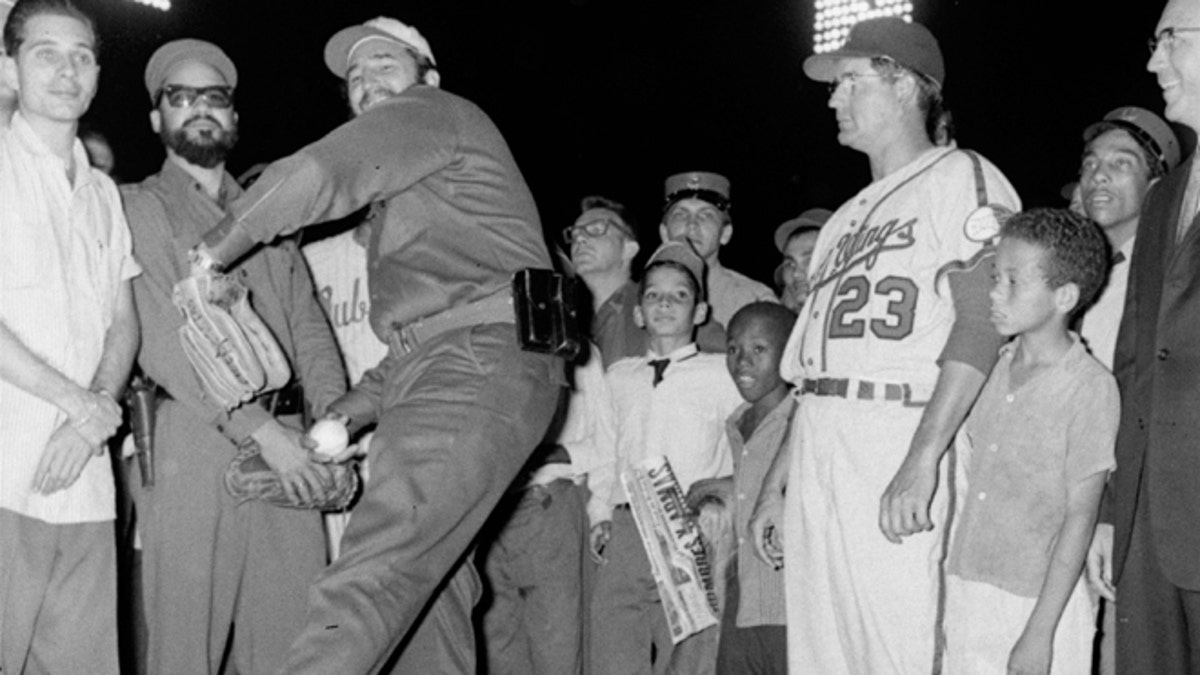
FILE - In this April 20, 1960, file photo, Cuban leader Fidel Castro tosses the traditional first ball at ceremonies opening the International League baseball season, in Havana, Cuba. At right is Rochester Red Wings manager Clyde King, whose Redwings met the 1959 Little World Series champion Havana Sugar Kings, in the season opener. In June, 1960 the Red Wings were the last American ball club to play a regulation game in Cuba until the Baltimore Orioles played an exhibition game in Havana in 1999. It's too soon to tell what impact the normalizing of relations between the U.S. and Cuba might have on the game. (AP Photo/File)
ROCHESTER, N.Y. (AP) – News that President Barack Obama is moving to normalize relations with Cuba has some baseball fans remembering a time when Cuban baseball was big, and the night in 1960 when the Rochester Red Wings fled Havana while explosions rocked the city. They were the last American team to play a regular game in Cuba before the U.S. embargo went into effect.
It was a time when the International League was truly international, featuring five teams in the United States, two in Canada, and one in Cuba — the Havana Sugar Kings. They were a farm club for the Washington Senators from 1947 to 1952, and then for the Cincinnati Reds. The Sugar Kings featured a number of future major league stars — including Cuban natives Leo Cardenas, Mike Cuellar, and Cookie Rojas — and won the International League Championship in 1959.
The Red Wings traveled to Havana for a series in late July that year. Before their game, Fidel Castro, the leader of the Cuban revolution, staged an exhibition game between a team of his supporters and a team of military police. Castro pitched two innings and helped whip the crowd into a frenzy.
The game stretched into extra innings, and at midnight the crowd erupted as the new day began. It was the 26th of July, a date traditionally celebrated as the beginning of the Cuban revolution.
Democrat and Chronicle reporter George Beahon, who was in the stadium that night, gave this account:
"Promptly at midnight, rockets in the background behind the stadium signaled the start of Cuba's first July 26 celebration. The Cuban anthem played and everyone rose to sing. At the same time, weapons inside and outside the ballpark began firing."
It wasn't simply a noisy spectacle. Bullets fired into the air must come down, of course. One stray bullet struck Red Wing infielder Frank Verdi in the head while he was warming up between innings. Fortunately for him, he was wearing a plastic helmet liner inside of his cap, otherwise he might have been killed. Verdi thought he had been struck by a baseball.
"Then I saw the bullet on the ground," Verdi later recounted. "It was a good size, a .45. It hit me right in the side of the head and took part of my ear off, then hit me in the shoulder. It really didn't bother me until an hour later, when I started to think about what happened. Hell, bullets were falling out of the sky like hailstones that night."
Havana shortstop Leo Cardenas was not so lucky. A bullet struck him in the right shoulder blade a few minutes later. At that point, both teams fled the field. The game ended in a tie.
A headline on the front page of the Democrat and Chronicle the next day offered this assessment: "Nightmare in Havana — Wings in Real Danger."
The International League had concerns about sending teams back to Cuba, canceling the rest of the Sugar Kings' homestand. An official apology issued by Cuba caused the league to reverse course.
Tensions between the United States and Cuba had increased significantly by the time the Red Wings returned to Havana in June of 1960. Shortly before the start of their double header, a deafening explosion shook Havana and cut off power to Gran Stadium, delaying the start of the game by an hour and a half.
"It was a warlike atmosphere," Beahon recounted. "The Cubans weren't even trying to hide their antagonism." The Red Wings lost the first game of a doubleheader, and the second game was halted by curfew in the ninth with the score tied 3-3. It was to be completed on the next Wings visit to Havana.
That visit would never happen.
Days later, under increasing pressure from Secretary of State Christian Herter, the International League moved the Sugar Kings from Havana to Jersey City, New Jersey, where they were rechristened the Jersey City Jerseys.
It would be almost 40 years before another American baseball team competed in Cuba. In March 1999, the Baltimore Orioles played an exhibition game against the Cuban national baseball team in Havana. One Orioles player, Cuban refugee Rafael Palmeiro, refused to participate, citing the hardships his family had endured under the Castro regime.
Hundreds of Cuban ballplayers have come to the United States to play baseball since Castro came to power. Many risked their lives and endured exploitation to escape.
Some have even speculated that an American team might move to Havana. But until that happens, the Rochester Red Wings will remain as the last American ball club to play a regulation game in Cuba.
Like us on Facebook








































